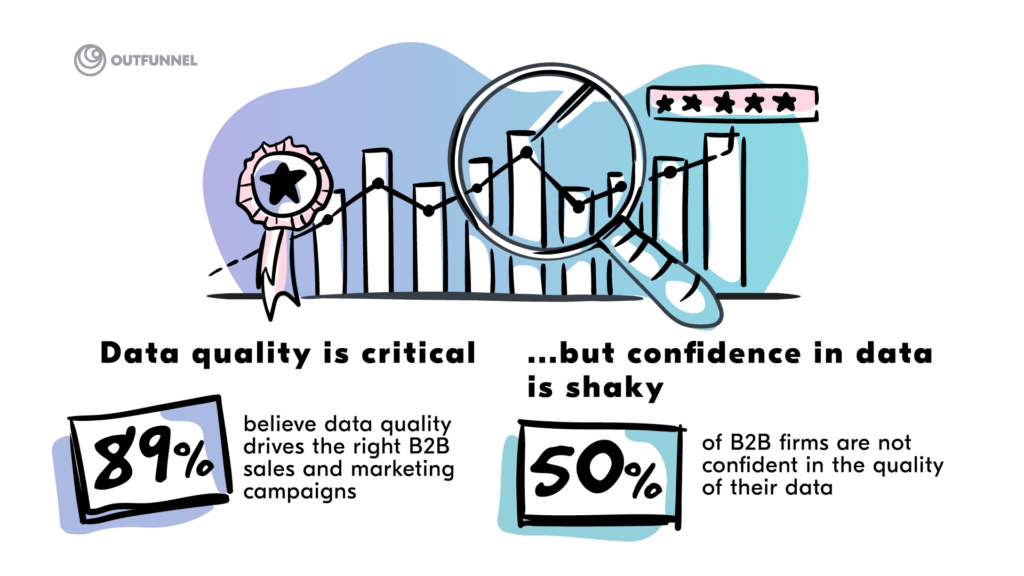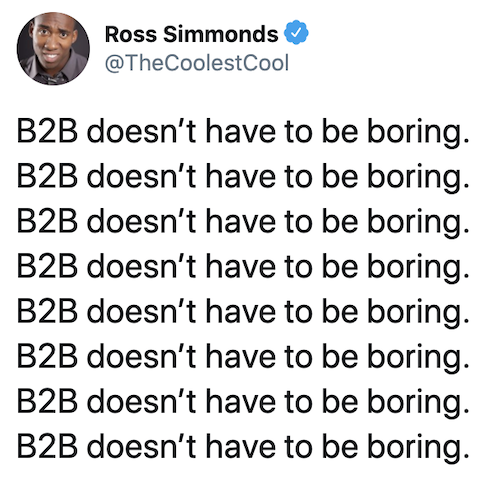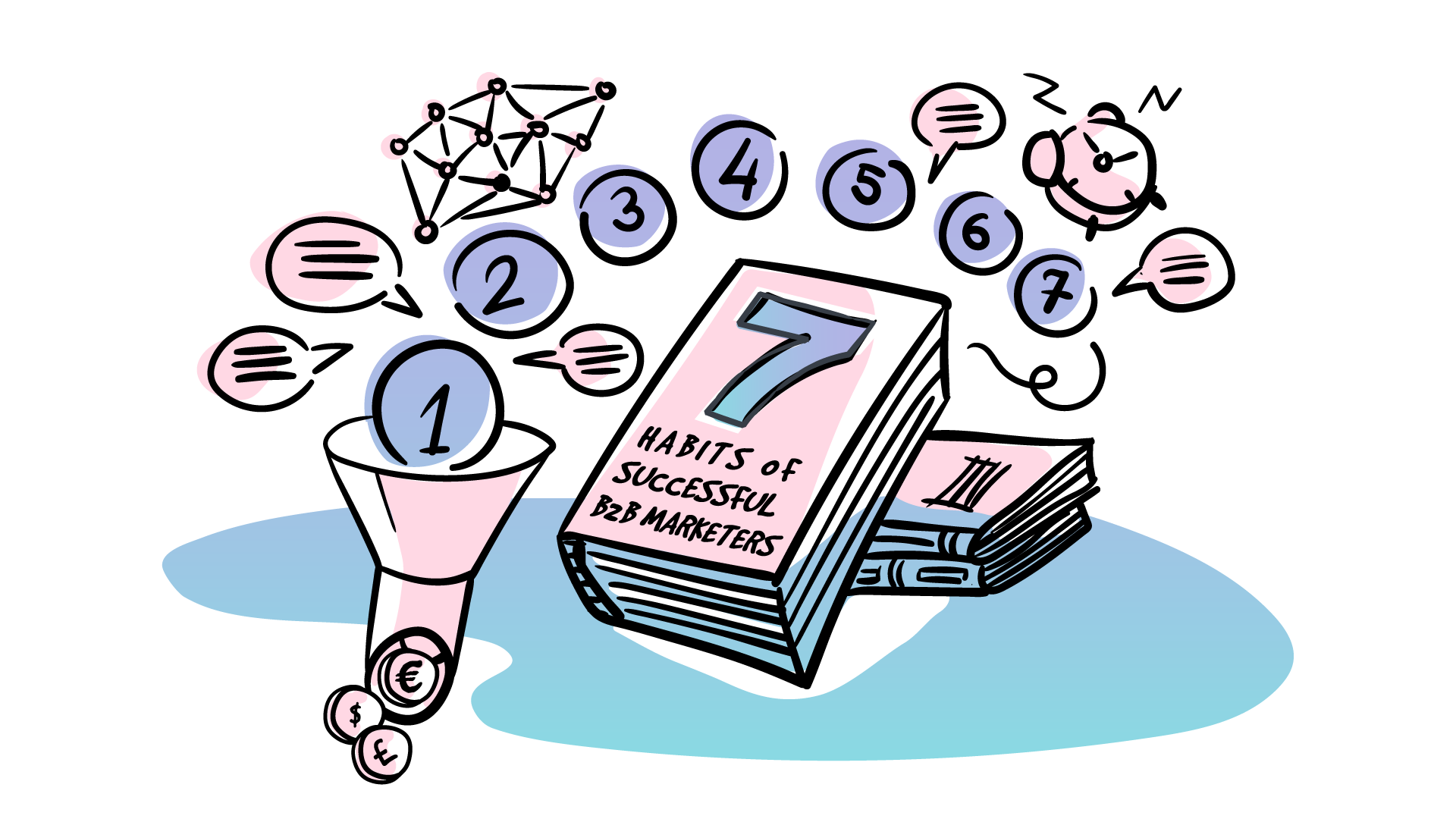It’s been a while since I picked up a copy of Stephen R. Covey’s much lauded “The 7 Habits of Highly Effective People.” But, as I sat on my sofa, a wall of books staring back at me, the spine of Mr Covey’s self-help classic caught my eye and got me thinking:
“What is it that makes successful B2B marketers?”
So, with the words of Pablo Picasso ringing in my ears, I decided to take a step back and make my own assessment of what habits are required to be a successful business-to-business marketer.
1. Take revenue responsibility
There’s long been this perception that marketing sits exclusively at the top of the funnel, and sales kicks in further down.
Marketing brings in the leads, sales converts those leads into customers.
But this approach often results in marketing being focused on metrics like page visits and leads, rather than actual revenue.
While I’m not saying that marketing should be solely responsible for your bottom line, tighter sales and marketing integration starts with marketing taking a more active role in generating revenue.
This revenue marketing approach does away with the traditional pipeline, instead bringing both sales and marketing together so they have equal input and, most importantly, equal responsibility for revenue.
Does this kind of exchange sound familiar?
Jenny S. Alesperson: “You’ve brought in all these leads, but none of them are converting into, you know, sales”
Sam M. Arketer: “Yeah, well, you should’ve been clearer in your brief and, anyway, my KPIs are lead-based, so you know…”
If I had a dollar for each time I’d heard something similar, I’d probably have at least several dollars by now.
So, take responsibility for revenue. Own your fortune and your fuck ups at the highest level, rather than ekeing out an existence chasing after metrics that, while important, don’t pay the bills.
Start developing this habit today: Set up conversion tracking so you can measure the effectiveness and ROI of your marketing efforts. That is, track conversions from your content. Track revenue generated from email campaigns. Keep an eye on traffic channels that convert to deals created and won. Own these KPIs, if you’re ready for it.
2. Embrace data*
Ah, data. Without it, digital marketing wouldn’t be where it is today.
Data enables not just B2B marketers to make better decisions, but it adds weight to your own pitch to customers.
Without good data, both you and your customers are fumbling in the dark, while a pack of sea lions bark incessantly (do sea lions bark or do they roar? Answers in the comments, please) at you, baying for your attention.
Data isn’t just the light that illuminates that dark room, but it’s a kick ass pair of noise cancelling headphones that allow you to listen to the sounds that actually matter.
But check that title again, and you’ll see that asterisk at the end, hanging there like an albatross.
You see, as marketers, our reliance on data has somewhat led to us following it a little too rigorously. In fact, only around half of B2B marketers have confidence in their data. And that lack of confidence isn’t totally unwarranted.

Be it bad data sanitization practices when handling incoming data, or straight up misrepresentation of statistics from data providers (the phrase “pivot-to-video” is likely carved into the minds of advertisers and publishers around the globe), embracing isn’t just about taking everything you lay eyes on at face value.
“Embrace data” means having a set of rigorous standards for how you gather and analyze your own data, as well as how you present data to your customers.
Make data-backed decisions, but don’t let sweet looking stats bewitch you in an instant.
Start developing this habit today: Next time you’re about to make a markting decision based on your gut, look up some data on it. Does the data back it up?
3. Be active in the marketing community and build a network
Good marketers recognize that they have a specialty and focus on it.
The most effective marketers, on the other hand, augment that by tapping into the marketing community. Be it for advice or practical help, taking an active role in your community pays dividends.
It’s kind of a snowball effect. By having a voice, sharing thoughts and helping others, it adds weight to what you say. And the more you share, the more weight your words carry.
At times, marketing can be an ocean of work and responsibility. It’s important to have others around you who can share their own experience and, maybe from time to time, lend you an oar or two as you make your journey.
Start developing this habit today: Find relevant groups of marketers working in your industry. There’s plenty to choose from on Facebook, Linkedin, or even Reddit. Follow them, chip in when you see someone looking for help or advice. And if you see someone offering something you need, don’t be too proud to accept.
4. Set aside time for creative work
It can be hard to “find time” for creative work. I mean, surely being creative happens when it happens, right? It’s kind of a spur of the moment thing, surely?
Well, I kind of disagree.
While, yes, it can be hard to sit down and say “now, I am going to be creative”, you can do some things to help.
But, before I go into the practical advice: why should you bother? I often hear this bullshit argument that B2B marketing should be a certain way because it’s aimed at “businesses”. No. Just. No.

These are human beings you’re talking to (more on this in the next point).
And what allows us, as marketers, to stand out to those fellow humans, is our creativity. It’s what allows us to breathe life and character into what we’re saying.
So: practical tips.
Don’t let yourself drown in busy work. It’s important to keep on top of your non-creative tasks, but pick a half or whole day a week and allow yourself the space to be creative. The ideas that come to you in the midst of your busy work, jot down. Then return to these ideas when you’re in the right place.
Then, get comfortable, stay hydrated, and don’t be afraid to drift off and stare out the window from time to time (even if it can lead to some awkward “are they looking at me?” type moments).
Start developing this habit today: Open your calendar. Block off half a day (or a whole day, if you’re feeling bold) next week for creative work. Make it a recurring event. When the day comes, switch off your Slacks and Ahrefs and Twitters and get creative.
5. Speak the language of your customers (so the marketing “speaks” to your customers)
The key part of speaking the language of your customers involves you shutting the hell up for a moment.
Listen to them.
You probably don’t hear a load of buzzwords. If you hear jargon, it’s probably the jargon that’s relevant to your industry.
Taking the time to listen to not just what they’re saying, but how they say it, allows you to become a more effective B2B marketer because you’re able to appeal to resonate with them on an emotional level.
You’re able to connect with them.
Remember, these are people. Not faceless corporations. They want to feel like you’re actually talking to them, not shouting into a void.
Start developing this habit today: Make use of your customer reviews. Attend sales calls. Review support inquiries. Copy, paste, highlight the best sentences, words and phrases. And edit away. You don’t have to just take my word for it, one of the most vocal and successful B2B marketers Dave Gerhardt summed this up pretty well in a LinkedIn post recently:
“The best copy is rarely written—it’s a job of copy, paste, and edit with your customers’ words. Match stuff together, use their words, not yours. Use that for your new website. Use this process and you’ll cure writer’s block and level up your product marketing.”
– Dave Gerhardt CMO of Privy
6. Be adventurous (try out new channels, techniques)
While there’s a lot of value in the tried-and-true methods in B2B marketing, the highly effective B2B marketer is not afraid to stray from the beaten path and try their own approach.
Take Ahrefs CMO, Tim Soulo for example. Where most SaaS busineses offer a free trial, Ahrefs go their own way and ask for 7USD for a 7 day trial.
Not only that, he doesn’t use Google Analytics. At all. Which kind of flies in the face of rule 2: “Embrace data”. But, isn’t that the point?
Being adventurous and carving out a new path often means breaking not just convention, but your own rules as well.

Start developing this habit today: Listen to the insightful episode of The Growth Hub podcast with Tim Suolo and amass all the inspiration for being adventurous in marketing. Then go ahead and subsribe to the podcast to learn more from successful B2B marketers.
7. Be a good storyteller (reading fiction helps!)
Telling a good story doesn’t mean endless, interweaving narratives and reams of colorful prose.
Here’s a pretty short, haunting story for you:
For sale: baby shoes, never worn.
That gut-wrenching 6-word narrative does everything it needs to: delivers a clear, concise message while at the same time conjuring a wealth of imagery for the reader.
Being able to tell a story, whether it’s in a 6-word H1 title at the top of your homepage or a 5000 word piece on email marketing trends is what makes the difference between something being purely informative and also being evocative, making your reader actually feel something.
I want to bring value, but I also want people to enjoy what they’re reading. I want what I am writing to evoke some sort of emotion.
While you can learn about storytelling by reading the work of fellow marketers, taking the time to read fiction helps. Or, if you’re like me and you end up with a wall of books you’re still meaning to read or re-read, there’s always Audible.
Start developing this habit today: When you’re done with work for today, pick up that fiction book you’ve been meaning to get to for a while. Just read. Whether it’s 5, 10 or 50 pages you get to, you’ll already see what we mean by storytelling.



